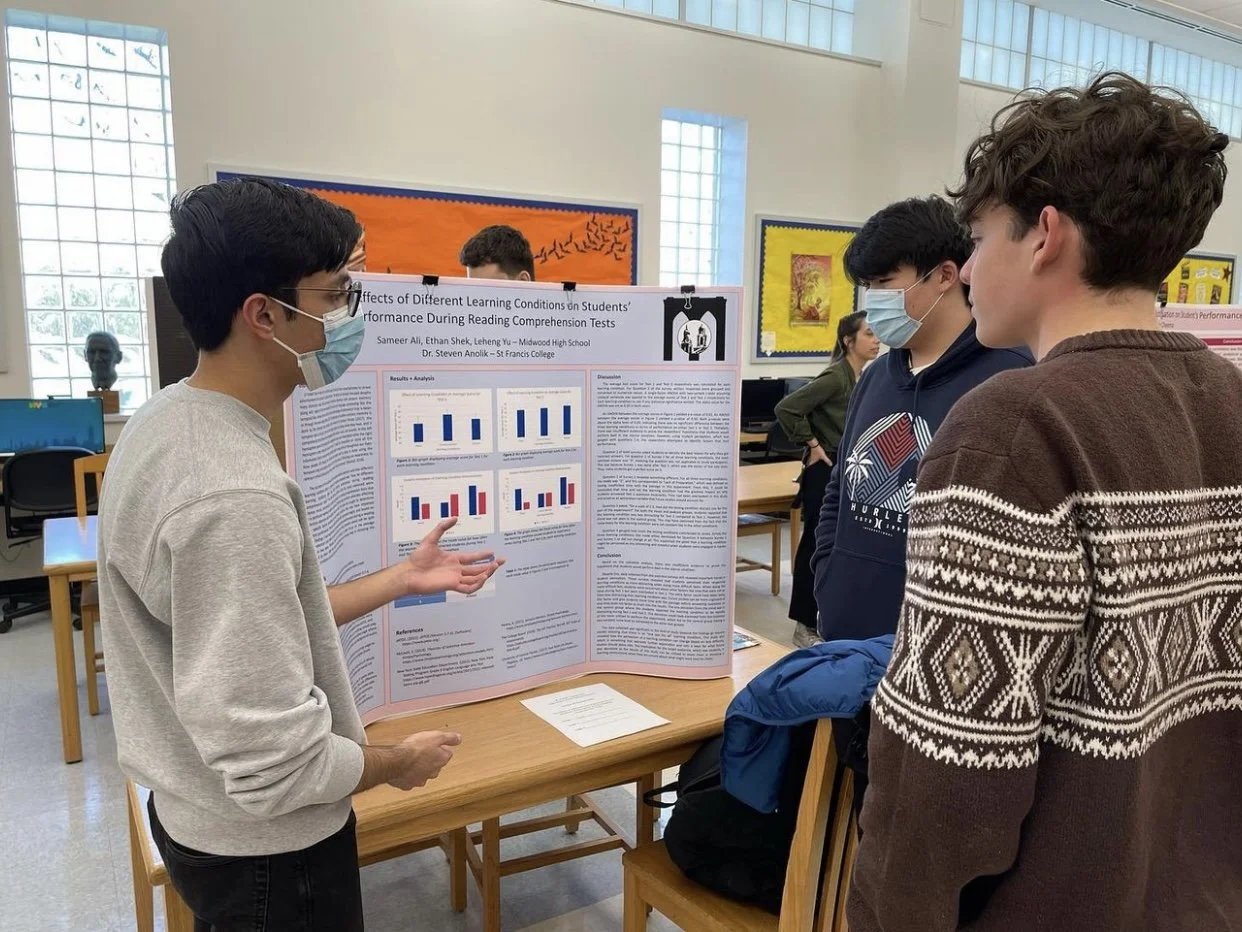Seniors' Science Research Projects Earn Honors at St. Joseph's University
Students presented to their peers in preparation for the February 4 contest. Photo: Ms. Stacy Goldstein
By JINYU XU and XUE FENG ZOU
Twenty seniors in the science research program entered the St. Joseph’s University 25th Annual Research Poster Session on February 4, coming back after a three-year pandemic hiatus to win three awards.
“We've been going to St. Joseph’s since the 90s, when they first started it,” said Mr. Glenn Elert, the science research coordinator. “It was very small when it started and it was held in the chem lab. But now it's bigger. There were more than 100 projects this year.”
High school students from all over New York City presented their research on poster boards to a variety of judges from different fields. Even with fierce competition, seniors Anne Barshay, Samia Farid, Shefa Sharafa, and Edward Chok received honorable mentions for their projects in the health and medicine and animal science fields.
Seniors in the science research class, led by Mr. Elert and Ms. Stacy Goldstein, have been working on their projects since their junior year. The winning seniors worked with mentoring professors from Harvard University, SUNY Downstate Health Sciences University, and Brooklyn College.
Barshay, who researched “The Association of Dietary Whole Grains with Coronary Heart Disease,” found inspiration from her personal experiences.
“When I was in sophomore year, my dad was diagnosed with coronary heart disease,” Barshay said. “Previously I thought that high cholesterol caused coronary heart disease, but what he had was phenomenal triglycerides. I was curious as to how triglycerides affect the heart.”
Samia Farid and Shefa Sharafa’s study of masks and acne was among the winning projects. Photo: Stacy Goldstein
Farid and Sharafa researched “The Effect of Covid 19 PPE Masks on Acne Vulgaris and Atopic Dermatitis” because of their interests in dermatology and acne eczema.
“When we started this project, Covid rates were high and masks and skin care were popular,” Sharafa said. “People were trying to compare masks and their effects on skin conditions.”
Chok, who researched “Patterns in Monk Parakeet Nest Construction,” was inspired by his passion for ornithology. He credited Dr. Grasso, his mentor, for offering him valuable assistance.
“He is unique in that he hosts weekly meetings, like group meetings with other researchers,” Chok said. “It gives me advice and steers me towards what to do next in the project.”
While there are challenges that come with pursuing research such as the stress of developing the right area of study, Ms. Goldstein and Mr. Elert are there to help, serving as in-school mentors throughout the two years by guiding students through finding topics and conducting experiments.
“Going in, [a student’s topic] might not be the thing they first thought they were going to study, but maybe it's even more interesting than what they thought they were going to do,” Ms. Goldstein said. “So having an open mind is important.”
To prepare for the in-person competition, students practiced by presenting their posters to their peers.
“I learned how to compartmentalize performance anxiety because when I present, I get really nervous,” Barshay said. “I had to learn to take a deep breath and jump in the back of my head and just say what I know.”
While some seniors continue their research after high school, others simply go into college or the professional world with solid scientific experience under their belts.
“Since we had a really small sample size, which led our whole study to be inconclusive, I would continue this or go into further research by having a more representative sample size and a bigger population to study than high school students,” Sharafa said.
“I’m unsure if I want to continue my research, but I think the stuff I learned will help with academic papers,” Chok said. “Every time you submit a draft to Mr. Elert, you get sent back a bunch of corrections. So he really helps you iron out the details and what needs to be included.”
The current class of juniors will soon be stepping up to the poster challenge, with valuable advice from the award-winning seniors.
“If you have an interest in your research topic, you will be more willing to put the time and energy into it,” Farid said. “We learned a lot from the experience.”


